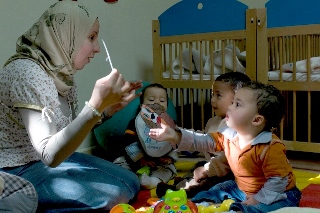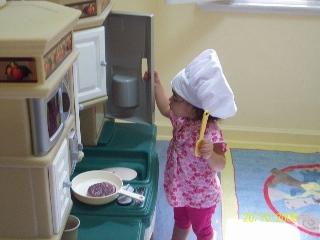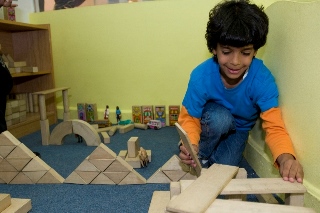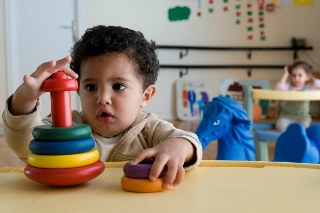At The Baby Academy we follow an internationally recognized, tried, tested and constantly up-dated curriculum designed specifically for children from birth to 5 years of age:
The Creative Curriculum.
This curriculum advocates children learning through exploratory and active play. Our teachers are trained and coached in planning activities and providing opportunities to meet the learning goals appropriate to each child’s developmental level.
This curriculum is offered in English, French, and German according to the parents’ preferences.
The Creative Curriculum focuses on 5 main areas of development:
- Social & emotional development
- Physical development (gross & fine motor skills)
- Language development (expressive & receptive)
- Literacy (pre-reading & pre-writing )
- Cognitive Development (pre- math)
When a child first enters The Baby Academy, he/she is placed in one of 5 classes (according to age):
- Infants – 3 months to 1 year
- Toddlers – 1 year to 2 years
- Juniors – 2 years to 3 years
- Seniors – 3 years to 4 years
- Preschoolers – 4 years to 5 years
A developmental assessment is conducted on the child one month after he/she has started attending The Baby Academy® in order to evaluate how he/she is progressing within his/her class. According to the results of that assessment, a meeting is conducted with the parents, and the child may be moved from one class to another. All our classes enjoy a structured schedule that allows for flexibility.
We have successfully adopted a “center-based” learning approach. The concept behind this approach relies on the much-studied and applied theory that children learn best through play. Following are the centers we have created for each class:
- Games & Puzzles Center – for table games, puzzles, visual discrimination, and threading.
- Reading & Listening Center – teaching them to enjoy reading and listening to stories, as well as providing them with many pre-reading stimulation.
- Dramatic Center – teaching children to take on a role and engage in imitative behavior and make-believe play.
- Block & Construction Center – for playing with blocks, Lego, and Mechano.
- Creative Center – teaching as well as enhancing talents through painting, coloring, play dough, cutting and pasting.
- Writing Center – to teach pre-writing and writing skills as well as enhance their fine motor and manual dexterity.
- Math & Science Center – for experimentation with and learning about numbers, counting, weights, nature exploration, etc.
Centers provide a less intimidating environment for the students and give the teachers the opportunity to focus on specific areas of study. They also bring out the talents and inclinations within each child’s personality. Moreover, working with children in a small group setting allows for more direct teaching and enhanced student response.
The more structured activities we provide our children are the following:
- Music: children are taught different sounds, instruments, nursery songs, as well as rhyming and rhythm-following.
- Arts & Crafts: children learn to experiment with different textures and materials. They also learn to paint and draw along with designing play dough and paper machee.
To support our curriculum we additionally follow the
High/Scope Approach (internationally recognized, research-based and grounded in child development) which enables us to deliver our curriculum following a supportive Active Learning approach. Our staff teams are trained and eventually certified (through High/Scope GB) in using this approach across all age ranges and all sections.
(For more information go to www.highscope.org or www.highscope.org.uk)
Our teams (teachers, supervisors, trainers, managers and directors) are always researching current developments in the field of Early Childhood education and care and constantly update and refine our services and provision.
Our Learning Environment
Our
indoor classrooms are clean, safe and well-maintained. We provide a range of materials for children to explore and interact with. Our materials range from specifically designed educational toys and equipment (puzzles, construction toys etc) to very open-ended recycled and natural materials (empty food containers, pine tree cones, bottle tops etc). We follow a commonly-held early childhood philosophy that children “learn by exploring the stuff the world is made of” and we aim to provide this in a safe and hygienic way.
Similarly our
outdoor environments have a mix of materials and toys to stimulate many different kinds of potential learning experiences through play; with health and safety very much at the forefront of all material and activity choices.
Inclusion
We endeavour to meet all children's individual needs and aim to include every child regardless of any special needs, whilst ensuring the needs of other children will not be disadvantaged.
Wherever possible, children with physical disabilities, learning or behavioral difficulties, and gifted children will be considered for a place; taking into account their individual circumstances and the ability of The Baby Academy to provide the necessary standard of care.
Careful planning with parents to consider the individual child's needs and wants will be particularly important for the child's welfare and happiness.
Provision for all ages
We organize children into class groups by age and preferred language of learning
(English, French or German).
Heads Up, Lookers and Communicators. During their first months young babies react to people and situations with their whole bodies and all their senses.

They are also competent in observing and responding to their immediate environment and communicating with those around them. In our
Infant rooms (3 – 15 months) we look after up to 9 infants every day and are very well equipped to cater for all their needs. We hold a variety of activities such as messy play, music and movement activities, choices time (including treasure baskets), sensory areas and plenty of play opportunities, indoors and out; all planned with their individual interests and stage of development in mind. Adults offer care, support and interactions to encourage their full development.
Movers, Shakers and Players
Walkers, Talkers and Pretenders
At this age children begin to show an increasing independence and obvious pleasure in moving, communicating and learning through play. They show gradually increasing confidence in themselves and their skills at making relationships and will be able to work and play within classes of larger social groups.

During this time your child will transfer into a
Junior class (2 – 3 years). In our Junior rooms, we look after up to 15 children and they have the opportunity to join in with diverse activities including Choice Time, Small Group times, Large Group Times, Circle Time, Outdoor play, Music and Movement activities, Art activities. Their group times begin to focus more on acquiring and refining basic skills as defined in the Creative Curriculum learning areas. At this age their play starts to be much more purposeful and we are able to introduce the children to simple Planning and Recall Times when they indicate choices and reflect on things they have done. Their learning is still very “hands-on” and Active.
Also at this age children will be experiencing the change from nappies to potties and toilets. Whatever the challenge, you can be assured that our staff are well trained, motivated and committed and work alongside parents during this transition.
Experimenters, Players and Questioners
At this age children deepen their understanding by playing, talking, observing, planning, questioning, experimenting, testing, repeating, reflecting and responding to adults and to each other.

In our
Senior class (3 – 4 yrs) we have a maximum number of 18 children and in
Pre-School class (4 – 5 yrs) we cater for up to 20 children. The rooms are divided into specific areas of learning and play, and many of the activities are geared towards the children’s ongoing all round development of basic skills and their needs once they go onto school.
Our Creative Curriculum and High/Scope approach are the ideal tools to enable this preparation phase to succeed. Their Daily Routine incorporates familiar elements (Circle Time, Planning Time, Work (Choices) Time, Recall Time, PE, Music, Art, Small Group Times, Large Group Times, Outdoor Time) and learning opportunities are planned across all curriculum areas which enable them to progress and develop at their own pace.
 They are also competent in observing and responding to their immediate environment and communicating with those around them. In our Infant rooms (3 – 15 months) we look after up to 9 infants every day and are very well equipped to cater for all their needs. We hold a variety of activities such as messy play, music and movement activities, choices time (including treasure baskets), sensory areas and plenty of play opportunities, indoors and out; all planned with their individual interests and stage of development in mind. Adults offer care, support and interactions to encourage their full development.
They are also competent in observing and responding to their immediate environment and communicating with those around them. In our Infant rooms (3 – 15 months) we look after up to 9 infants every day and are very well equipped to cater for all their needs. We hold a variety of activities such as messy play, music and movement activities, choices time (including treasure baskets), sensory areas and plenty of play opportunities, indoors and out; all planned with their individual interests and stage of development in mind. Adults offer care, support and interactions to encourage their full development. Increasing mobility and language development enable them to find out and understand more about the world. Most of our older infants and toddlers in these rooms will be making their first steps in terms of walking, talking and feeding themselves and we therefore make every effort to ensure staff and parents are working very closely together so no one misses those special moments. In our Toddler rooms we look after up to 12 active toddlers and they have the opportunity to join in a wide range of activities including Choice Time, Small Group Times, Large Group Times, Circle Time, Outdoor play, Music and Movement activities, Art activities. We understand that their exploration and play at this age is still very sensory and we provide materials and activities which encourage their all round development through a multisensory approach.
Increasing mobility and language development enable them to find out and understand more about the world. Most of our older infants and toddlers in these rooms will be making their first steps in terms of walking, talking and feeding themselves and we therefore make every effort to ensure staff and parents are working very closely together so no one misses those special moments. In our Toddler rooms we look after up to 12 active toddlers and they have the opportunity to join in a wide range of activities including Choice Time, Small Group Times, Large Group Times, Circle Time, Outdoor play, Music and Movement activities, Art activities. We understand that their exploration and play at this age is still very sensory and we provide materials and activities which encourage their all round development through a multisensory approach. During this time your child will transfer into a Junior class (2 – 3 years). In our Junior rooms, we look after up to 15 children and they have the opportunity to join in with diverse activities including Choice Time, Small Group times, Large Group Times, Circle Time, Outdoor play, Music and Movement activities, Art activities. Their group times begin to focus more on acquiring and refining basic skills as defined in the Creative Curriculum learning areas. At this age their play starts to be much more purposeful and we are able to introduce the children to simple Planning and Recall Times when they indicate choices and reflect on things they have done. Their learning is still very “hands-on” and Active.
During this time your child will transfer into a Junior class (2 – 3 years). In our Junior rooms, we look after up to 15 children and they have the opportunity to join in with diverse activities including Choice Time, Small Group times, Large Group Times, Circle Time, Outdoor play, Music and Movement activities, Art activities. Their group times begin to focus more on acquiring and refining basic skills as defined in the Creative Curriculum learning areas. At this age their play starts to be much more purposeful and we are able to introduce the children to simple Planning and Recall Times when they indicate choices and reflect on things they have done. Their learning is still very “hands-on” and Active. In our Senior class (3 – 4 yrs) we have a maximum number of 18 children and in Pre-School class (4 – 5 yrs) we cater for up to 20 children. The rooms are divided into specific areas of learning and play, and many of the activities are geared towards the children’s ongoing all round development of basic skills and their needs once they go onto school.
In our Senior class (3 – 4 yrs) we have a maximum number of 18 children and in Pre-School class (4 – 5 yrs) we cater for up to 20 children. The rooms are divided into specific areas of learning and play, and many of the activities are geared towards the children’s ongoing all round development of basic skills and their needs once they go onto school.